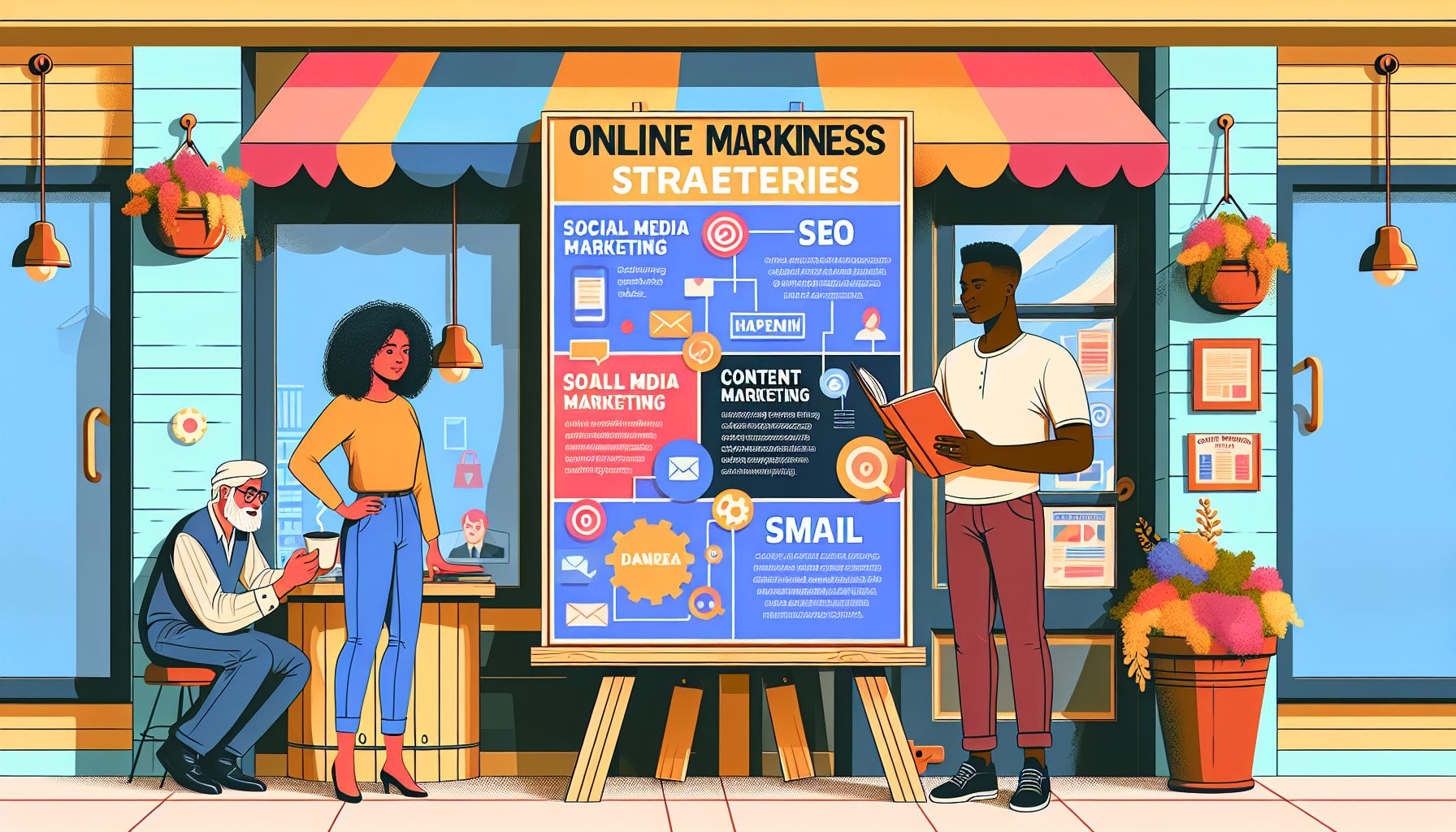Monthly Archives: March 2024


Mastering SEO for Business Owners: A Guide to Boosting Your Online Presence
As a business owner, you understand the importance of having a strong online presence. With the majority of consumers turning to the internet to find products and services, it’s crucial that your website ranks high on search engine results pages. This is where Search Engine Optimization (SEO) comes into play.
SEO is the process of optimizing your website to improve its visibility on search engines like Google. By implementing effective SEO strategies, you can drive more organic traffic to your site, increase brand awareness, and ultimately boost your revenue. In this guide, we’ll walk you through the basics of SEO and provide you with tips on how to optimize your website for search engines.
Understanding Keywords
Keywords are the foundation of any successful SEO strategy. These are the words and phrases that people type into search engines when looking for information. By incorporating relevant keywords into your website content, you can improve your chances of ranking higher in search results.
Start by conducting keyword research to identify the terms that your target audience is searching for. There are plenty of tools available, such as Google Keyword Planner and SEMrush, that can help you with this process. Once you have a list of relevant keywords, strategically place them throughout your website content, including in titles, headings, meta descriptions, and body copy.
Creating Quality Content
In addition to using the right keywords, you also need to focus on creating high-quality, engaging content. Search engines prioritize websites that provide valuable information to users. This means writing informative blog posts, product descriptions, and landing pages that address the needs and interests of your audience.
Make sure your content is well-written, free of grammatical errors, and easy to read. Include images, videos, and infographics to enhance the user experience. The more valuable and relevant your content is, the more likely it is to be shared and linked to by other websites, which can further boost your SEO efforts.
Optimizing Your Website
Aside from keywords and content, there are several technical aspects of your website that can impact your search engine rankings. Make sure your site is mobile-friendly, as Google now prioritizes mobile-responsive websites in its rankings. Improve your site speed by optimizing images, minifying code, and utilizing browser caching.
Optimize your URLs, meta tags, and headers to make it easier for search engines to crawl and index your site. Create an XML sitemap to help search engines understand the structure of your website. By paying attention to these technical details, you can improve your website’s overall SEO performance.
Building Backlinks
Backlinks are links from other websites that point to your site. They are an important factor in determining your website’s authority and credibility in the eyes of search engines. The more high-quality backlinks you have, the better your chances of ranking higher in search results.
Reach out to industry influencers, bloggers, and journalists to ask for backlinks to your site. Guest posting on other websites is also a great way to earn backlinks and drive more traffic to your site. Make sure the websites linking to yours are reputable and relevant to your industry to maximize the SEO benefits.
Monitoring and Analyzing Results
SEO is an ongoing process that requires constant monitoring and adjustments. Use tools like Google Analytics and Google Search Console to track your website’s performance, including traffic, rankings, and keyword visibility. Pay attention to which keywords are driving the most traffic to your site and adjust your strategy accordingly.
Regularly review your SEO efforts to identify areas for improvement. Experiment with different keywords, content types, and link-building tactics to see what works best for your website. By staying informed and adapting to changes in the SEO landscape, you can continuously improve your website’s visibility and drive more organic traffic.
Conclusion
Mastering SEO is essential for business owners looking to increase their online visibility and attract more customers. By understanding keywords, creating quality content, optimizing your website, building backlinks, and monitoring your results, you can effectively improve your website’s SEO performance and drive more organic traffic. Implement the tips in this guide and watch as your website climbs the search engine rankings, ultimately leading to increased brand awareness and revenue for your business.


Online Marketing Tips for Small Business Owners
As a small business owner, you understand the importance of reaching your target audience in order to grow your business. In today’s digital age, online marketing is essential for businesses of all sizes, including small businesses. However, navigating the world of online marketing can be overwhelming, especially when you have limited time and resources.
Luckily, there are several strategies that small business owners can implement to effectively market their products or services online. From social media marketing to search engine optimization (SEO), here are some tips to help you make the most out of your online marketing efforts.
1. Define Your Goals
Before diving into online marketing, it’s important to establish clear goals for what you want to achieve. Whether you’re looking to increase website traffic, generate leads, or boost sales, having a clear understanding of your objectives will help guide your online marketing strategy.
2. Know Your Audience
In order to effectively market your products or services online, you need to have a deep understanding of your target audience. Take the time to research your audience’s demographics, interests, and online behavior. This will allow you to tailor your marketing efforts to better reach and engage with your audience.
3. Utilize Social Media
Social media is a powerful tool for small businesses looking to connect with their customers. Create profiles on popular social media platforms such as Facebook, Instagram, and Twitter, and regularly share relevant content that resonates with your audience. Engage with your followers by responding to comments and messages, and use social media analytics to track the performance of your posts.
4. Invest in SEO
Search engine optimization (SEO) is crucial for improving your website’s visibility in search engine results. Optimize your website with relevant keywords, create high-quality content, and build backlinks from reputable websites to improve your search engine rankings. Regularly monitor your website’s SEO performance and make adjustments as needed to stay competitive.
5. Email Marketing
Email marketing is a cost-effective way to reach your customers directly. Build an email list of interested customers and send them regular updates, promotions, and newsletters. Personalize your emails to make them more engaging, and track the performance of your email campaigns to measure their effectiveness.
6. Consider Paid Advertising
While organic methods such as SEO and social media are effective, paid advertising can help boost your online visibility and reach a larger audience. Consider investing in pay-per-click (PPC) advertising on platforms such as Google AdWords or social media ads on Facebook and Instagram to drive targeted traffic to your website.
Conclusion
In conclusion, online marketing is a valuable tool for small business owners looking to grow their businesses. By defining your goals, knowing your audience, utilizing social media, investing in SEO, and leveraging email marketing and paid advertising, you can effectively reach and engage with your target audience online. Remember to regularly monitor and adjust your online marketing strategies to stay ahead of the competition and achieve your business goals.


Boost Your Business with SEO: A Guide for Small Business Owners
Are you a small business owner looking to improve your online presence and attract more customers? Search Engine Optimization (SEO) is the key to achieving these goals. SEO is a powerful tool that can help you rank higher in search engine results, drive more traffic to your website, and ultimately increase your sales. In this guide, we will discuss the basics of SEO and provide you with tips on how to optimize your website for maximum visibility.
What is SEO?
SEO is the process of optimizing your website so that it ranks higher in search engine results for relevant keywords. When potential customers search for products or services that you offer, you want your website to appear at the top of the results page. By improving your website’s SEO, you can increase its visibility and attract more organic traffic.
Keyword Research
Keywords are the foundation of SEO. Before you can optimize your website, you need to identify the keywords that your target audience is using to search for your products or services. There are many tools available, such as Google Keyword Planner and SEMrush, that can help you find relevant keywords with high search volume and low competition.
Once you have identified your target keywords, incorporate them into your website’s content, meta tags, and URLs. However, be sure not to overdo it—keyword stuffing can actually harm your SEO efforts.
On-Page Optimization
On-page optimization refers to the process of optimizing individual web pages to improve their search engine rankings. This involves optimizing your website’s content, meta tags, headings, and images. Make sure that your content is high-quality, relevant, and engaging to your target audience.
In addition, pay attention to your website’s loading speed, mobile-friendliness, and user experience. Search engines prioritize websites that provide a positive user experience, so make sure that your website is easy to navigate and visually appealing.
Off-Page Optimization
Off-page optimization refers to activities that take place outside of your website and are aimed at improving its search engine rankings. This includes building backlinks from reputable websites, engaging with your audience on social media, and creating high-quality content that others will want to share.
Backlinks are an important ranking factor for search engines, so focus on building high-quality, relevant backlinks from authoritative websites in your industry. This will not only improve your website’s SEO but also drive more traffic to your website from these external sources.
Tracking and Monitoring
Finally, it’s important to track and monitor your website’s performance to see how your SEO efforts are paying off. Use tools such as Google Analytics and Google Search Console to track your website’s traffic, rankings, and conversions. By analyzing this data, you can identify areas for improvement and make adjustments to your SEO strategy as needed.
In conclusion, SEO is a powerful tool that can help small business owners improve their online visibility and attract more customers. By focusing on keyword research, on-page and off-page optimization, and tracking and monitoring, you can optimize your website for maximum visibility and drive more traffic to your business. Remember, SEO is an ongoing process, so be patient and consistent in your efforts, and you will see results over time.


The Importance of Web Design for Business Owners
As a business owner, you know that having a strong online presence is crucial in today’s digital world. A well-designed website is often the first point of contact between your business and potential customers. It is your digital storefront, and just like a physical store, you want it to be inviting, easy to navigate, and reflective of your brand.
Web design plays a significant role in the success of your online presence. A poorly designed website can turn visitors away, while a well-designed one can convert them into loyal customers. In this blog post, we will discuss the importance of web design for business owners and provide some tips on how to improve your website’s design.
The Impact of Web Design on Your Business
Your website is often the first impression that potential customers have of your business. If your website is outdated, confusing, or unappealing, visitors are more likely to leave and seek out a competitor with a more user-friendly site. On the other hand, a well-designed website can help you stand out from the competition, build trust with your audience, and drive conversions.
Aesthetics are not the only important aspect of web design. A good website should also be functional and easy to navigate. Your website’s layout, content, and features should all work together to create a seamless user experience. By investing in professional web design, you can ensure that your website not only looks great but also functions effectively to meet your business goals.
Tips for Improving Your Website’s Design
-
Simplify Your Design: Keep your design clean and clutter-free. Use white space to give your content room to breathe and make it easier for visitors to focus on the most important information.
-
Mobile Optimization: With more people using mobile devices to access the internet, it’s essential that your website is optimized for mobile. Make sure your website is responsive and looks great on any device.
-
Branding: Your website should reflect your brand identity. Use consistent colors, fonts, and imagery to create a cohesive brand experience for your visitors.
-
Easy Navigation: Make it easy for visitors to find what they’re looking for on your website. Use clear navigation menus, breadcrumbs, and internal links to guide them through your site.
-
Call to Action: Every page on your website should have a clear call to action. Whether it’s signing up for a newsletter, making a purchase, or contacting you for more information, make it easy for visitors to take the next step.
Conclusion
In conclusion, web design is an essential aspect of your online presence as a business owner. A well-designed website can attract new customers, build trust with your audience, and drive conversions. By investing in professional web design and following the tips outlined in this blog post, you can create a website that helps you achieve your business goals and stand out from the competition. Remember, your website is often the first point of contact with potential customers, so make sure it leaves a lasting impression.


How to Master Online Marketing for Your Business
As a business owner, the world of online marketing can often seem overwhelming. With countless strategies and platforms to choose from, it’s easy to feel lost in a sea of digital clutter. However, with the right approach and a solid plan in place, online marketing can be a powerful tool for growing your business and connecting with your target audience.
In this blog post, we’ll break down some key strategies and best practices for mastering online marketing as a business owner. From social media to email marketing, we’ll cover it all so you can start seeing real results for your business.
Understanding Your Audience
One of the most important aspects of online marketing is understanding your target audience. Before you even begin crafting your marketing strategy, you need to have a clear understanding of who your customers are, where they spend their time online, and what their pain points and needs are.
Take the time to research your target audience and create detailed customer personas. These personas should include demographics, interests, and buying behaviors so you can tailor your marketing efforts to resonate with your audience.
Choosing the Right Platforms
With so many different platforms available for online marketing, it’s essential to choose the right ones for your business. Whether you’re focusing on social media, email marketing, content marketing, or paid advertising, each platform has its strengths and weaknesses.
Consider where your target audience spends their time online and how they prefer to consume content. If your audience is active on Instagram, for example, it makes sense to focus on creating visually appealing content for that platform.
Creating Compelling Content
No matter which platforms you choose to focus on, creating compelling content is key to successful online marketing. Your content should be engaging, informative, and relevant to your target audience. Whether you’re sharing blog posts, videos, infographics, or social media posts, make sure that your content adds value to your audience and positions your business as an expert in your industry.
Consistency is also crucial when it comes to creating content. Establish a content calendar and stick to a regular posting schedule to keep your audience engaged and coming back for more.
Building Relationships
Online marketing is not just about promoting your products or services—it’s also about building and nurturing relationships with your audience. Engage with your followers on social media, respond to comments and messages, and show your audience that you value their input and feedback.
Building relationships with your audience can lead to increased brand loyalty, word-of-mouth referrals, and ultimately, more conversions for your business.
Measuring Success
Finally, no online marketing strategy is complete without measuring the success of your efforts. Set clear goals and key performance indicators (KPIs) for your online marketing campaigns so you can track your progress and make adjustments as needed.
Use tools like Google Analytics, social media insights, and email marketing metrics to track the performance of your campaigns and gain valuable insights into what’s working and what’s not. With this data, you can refine your strategy and optimize your campaigns for better results.
Conclusion
Online marketing can be a powerful tool for business owners looking to grow their brand and connect with their target audience. By understanding your audience, choosing the right platforms, creating compelling content, building relationships, and measuring success, you can create a successful online marketing strategy for your business.
Remember, online marketing is not a one-size-fits-all approach. Take the time to experiment with different strategies and tactics to find what works best for your business. With patience and persistence, you can master online marketing and see real results for your business.